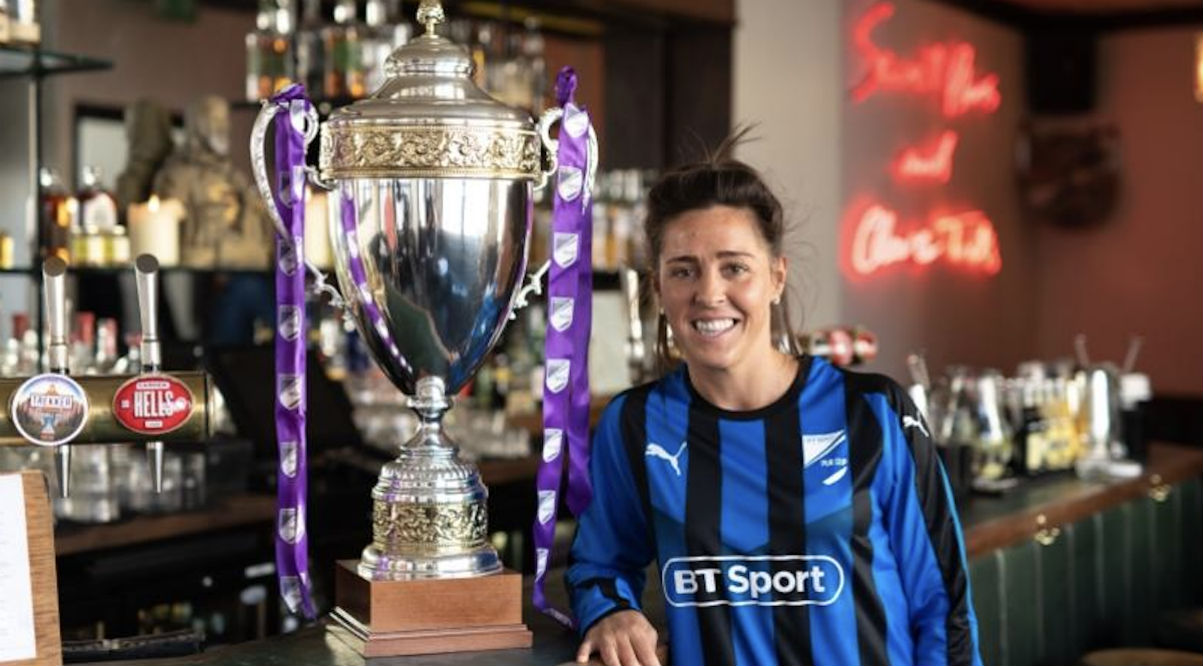
England legend Fara Williams has urged male football pundits to treat their female counterparts as they would other men, as she insists equality will only be achieved if more barriers are broken down.
Alex Scott and Rachel Brown-Finnis have led the way as they have taken centre-stage as pundits on top Premier League matches for BT Sport and Sky Sports this season, with England's most capped international player suggesting the criticism that has flowed in their direction on social media channels is evidence of resistance to change.
Speaking exclusively to Female First at the launch of BT Sport's Pub Cup, Reading midfielder Williams spoke passionately about a subject that has sparked plenty of debate over the course of this season, as she urged male pundits to embrace the new era of equality in the game.
"We should stop talking about whether someone is a male or female pundit," begins Williams, who has been capped 168 times at international level and received an MBE in 2016.
"If you are invited to be on air by a big company like BT Sport or Sky Sports, you are there as a pundit. Not because you are male or female. If you are only there because you are a female, that is not promoting progress, but Alex Scott and Rachel Brown have shown that they have a lot to offer this season.
"There will be resistance to change, of course. This has been a male-dominated world for a long time and suddenly we have a female voice coming into the mix, but the audience need to embrace it and I also think the male pundits should be able to talk to the male and female pundits in the same way.
"For example, if Graeme Souness disagrees with Jamie Carragher, he will let him know about it and if he diasgrees with what Alex Scott says, he should tell her without worrying whether people will criticise him if he objects to the view of the female pundit.
"If we want female pundits to be seen as equals, we cannot insist that we need to be spoken to in a certain way that is different to the men. Let's get rid of the labels male and female, you should be viewed as a football pundit and that should be it.
"This is something new. Both for the ex-players involved in the game as pundits and the viewers, having a women on the panel of pundits is a new development.
"Male pundits have been the only voices as pundits throughout the history of the game on television, so we have entered slightly new territory in the last couple of years. They have never heard a female voice in this setting before and I can see why some of the women in that position do feel under some pressure."
After Barclays announced a multi-million pound deal to sponsor the Women's Super League in England, Williams believes the women's game is ready to reach heights she never believed she would witness.
"If you had asked me five years ago whether the game would be in the place where it is now, I would defiantly have said no," continues Williams. "It's fantastic to see the growth both in participation levels and media coverage, as well as with the sponsorship deals that are coming into the women's game now.
"When a major company signs a massive deal with to sponsor the WSL, it highlights that the women's game is on the up and we have to grasp the moment now and build on this momentum."
Williams is playing a central role as a team captain in the BT Sport Pub Cup this year and she suggests the stereotypes that have long been attached to pub culture in England have been redefined following the boom in popularity of the women's game.
"Society has changed and the idea of women watching football in a pub of men watching them playing the game does not seem so strange," she adds. "There was a time when men used to go to the pub to watch football and the women stayed at home, but that perception has gone now and the image of football in general has been transformed.
"There are pubs across the country now that shows both male a female games and we want to see more and more of that."
The BT Sport Pub Cup will return for its third year in May and this time the tournament is set to be bigger than ever before - with 190 men's and women's pub football teams to compete at Premier League grounds.
Words by Kevin Palmer, who you can follow on Twitter @RealKevinPalmer.

